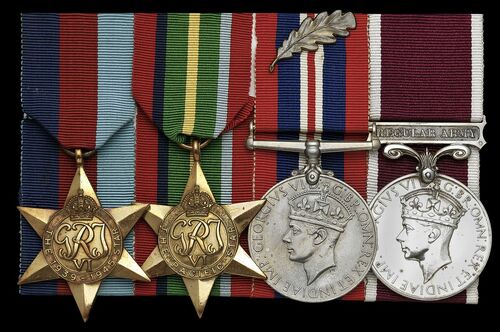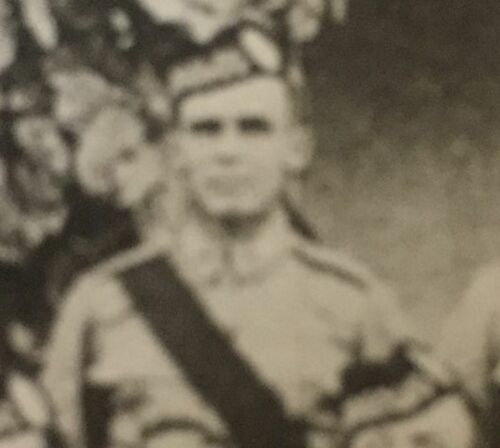Auction: 23003 - Orders, Decorations and Medals
Lot: 111
'A Jap section walked into an ambush set-up by the anti-aircraft platoon under Platoon Sergeant-Major Colvin. He was not only a resourceful Pioneer Sergeant and keen tactician, he was also a fine amateur yachtsman, an accomplishment that stood him in good stead, for he was to steal and sail a fishing boat over to Sumatra in order to escape when cut off at a later date behind the Japanese lines. Under his leadership, the Pioneer Platoon was as good in the jungle as any rifle platoon … '
So states the history of the 2nd Battalion, Argyll & Sutherland Highlanders.
'A Jap section was wiped out by the Bren-guns of Pioneer Sergeant-Major Colvin and Drummers McShane and Blythe … '
Job done; Moon over Malaya, refers.
An outstanding Second World War Malaya 1941-42 group of four awarded to Platoon Sergeant-Major F. W. Colvin, 2nd Argyll & Sutherland Highlanders, who was mentioned in despatches for his remarkable leadership and gallantry in one of the most bitterly fought campaigns of the war
His part in training the Argyll's Pioneer Platoon in jungle warfare was the subject of glowing reports, so, too, his inspiring resistance to the advancing Japanese
Having then been cut off behind enemy lines, 'the calm and cheerful' Colvin escaped the Malaya jungle and skippered a fishing boat to Sumatra, and thence took a prahu sailing vessel from Padang to Java, a journey of a thousand miles, but his courageous and determined endeavour to escape the clutches of the Japanese ultimately ended in captivity
1939-45 Star; Pacific Star; War Medal 1939-45, M.I.D. oak leaf; Regular Army L.S. & G.C., G.VI.R., 1st issue (5767223 Sgt. F. W. Colvin, A & S.H.), good very fine (4)
Frederick William Colvin was born on 21 January 1904 and enlisted in the Norfolk Regiment in November 1922. Having served in that capacity for the next 17 years, he transferred to the Argyll & Sutherland Highlanders in India on the eve of hostilities.
Embarked for Singapore as a Platoon Sergeant-Major in the 2nd Battalion in September 1941, he lent, as cited above, valuable service in jungle training in the period leading up to the Japanese invasion of Malaya. The ferocious fighting that ensued on the peninsula - not least in respect of the 2nd Argyll & Sutherland Highlanders - is a story imbued with much gallantry and sacrifice.
In a series of engagements at Titi Karangan, Sumpitan, Lenggong, Kota Tampan, Gopeng Dipang and Telok Anson the Argylls time and again gave vastly superior numbers of Japanese a very bad time, inflicting such casualties on the Japanese 5th Infantry Division that the Imperial Guards had to be brought south to relieve them. However, the Argylls were now exhausted and their ranks severely depleted.
On 7 January 1942, at Slim River, the Japanese brought their tanks and motorised infantry into play and the 2nd Argylls were among the battalions decimated. Only 94 of them returned to British lines. Several hundred more were thrown into the jungle where many remained at liberty for weeks and months and two men remained free until August 1945. A few reached Sumatra but most either died in the jungle or were captured.
As recounted above, Colvin was among those who remained at large in the jungle, prior to his remarkable seagoing escapades. His voyage in a stolen fishing vessel to Sumatra ended in the chaos playing out at Padang. Moon over Malaya takes up the story:
'In Padang the British Consul sent Montgomery-Campbell and his six Argylls, who included Bertie King and P.S.M. Colvin, to the docks, where they helped women and children board a British warship. They themselves were not allowed to escape with the Royal Navy but boarded a prahu, which sailed with some forty men on the same day as the ill-fated Rosenbaum … '
As confirmed by the regimental history, Colvin eventually reached Java, a thousand miles to the south, but he was captured in mid-March 1942 and incarcerated there in Bicycle Camp until May 1944. He was later moved to No. 1 Camp in Sumatra, where he was finally liberated in September 1945.
Colvin's 'gallant and distinguished services' in the Malaya campaign were subsequently recognised by a mention in despatches (London Gazette 1 August 1946, refers), and he emigrated to New Zealand, presumably with his wife Ivy, who is listed in official records as having been resident in Exeter during the war.
Subject to 20% VAT on Buyer’s Premium. For more information please view Terms and Conditions for Buyers.
Sold for
£1,100
Starting price
£320







